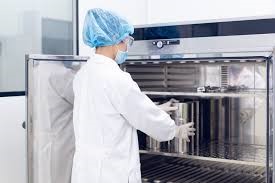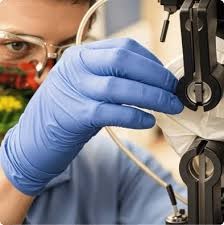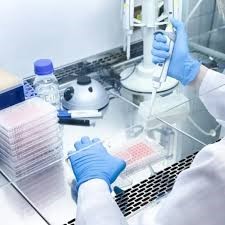TEXTILE MICROBIOLOGY
Microbial biotechnology is one of the branches of applied science with diverse applications. The need to safeguard fabrics against microbial attack particularly in industrial usage has long been recognised. Since, each and every entity in this world is prone to attack by microorganisms at some point; textile is no exception to it. Microorganisms are present everywhere in soil, water and air and they need nutrition for the growth. Depending on the substrate available for growth of microorganisms, the durability and aesthetic value of material varies.
The microorganisms play a vital role in deterioration of any material, which is susceptible to attack. The routinely used textile material or which is coming in contact with the body is more prone to attack by microorganisms. This is because during perspiration or when in contact with the body the organisms present on the body gets transferred on to cloth or related material. If such textile material is non-resistant to attack by microorganisms, then it can lead to deterioration and hence change in the physical properties. Such material is not only of poor quality but also can cause some skin irritation or allergies.
Hence, it is utmost important to incorporate some form of antimicrobial agent in the textile material to get good quality, longer durability and better aesthetic value. Many textile manufacturers and research laboratories are currently engaged in developing various anti-bacterial and anti-fungal finishes for textile products. The textile finish needs to have properties such as skin friendly and resistant to washings, for its effective usage along with its antibacterial or antifungal effect.
N.S. Envirotech Microbiology / Biotechnology laboratory is well equipped with modern instruments and the entire basic infrastructure that are needed to carry out routine microbiological work.
The department caters to the testing requirement of many national and international parties for assessment of textile materials using latest AATCC, ASTM and IS standards for home textiles and other related textile products. It also carries out antifungal activity assessment of textile materials specially carpets, floor coverings and packaging materials. The department also deals with testing of efficacy of antimicrobial finishing applied on high performance textiles directly and after repeated laundry washes. Bioburden test on export quality fabrics is also carried out.
Besides testing activities, it involves in spreading awareness among the young and aspirant Microbiologists about textile microbiology and related research through its workshops and training programmes.
LIST OF TESTS CARRIED OUT AT N.S. ENVIROTECH MICROBIOLOGY TEST SERVICES
- Antibacterial activity assessment of textile materials. Parallel Streak Method [AATCC 147]
- Antibacterial finishes on textile materials [AATCC 100]
- Antifungal activity, assessment on textiles material, mildew and rot resistance of textiles [AATCC 30]
- Standard practice for determining resistance of synthetic polymeric materials to fungi [ASTM G 21]
- Determining the antimicrobial activity of immobilized antimicrobial agents under dynamic contact conditions [ASTM: E2149]
- Testing for antibacterial activity and efficacy on textile products [JIS L 1902]
- Bioburden testing of textiles
- Sterility testing of treated material
- Microbial limit tests
- Detection of mildew/rot proofness [MIL-STD-810 F Method 508.5.1-12/01/2000]
- Evaluation of bacterial filtration efficacy of medical textile [ASTM F 2101]
- Method for testing cotton cordages for resistance to attack by microorganisms [IS 1386]
- Method for testing cotton fabric for resistance to attack by microorganism [IS 1389]
- Assessment of antimicrobial activity of carpets (Qualitative and quantitative)
- Minimum Inhibitory Concentration (MIC) of soluble compounds by Inhouse method.




